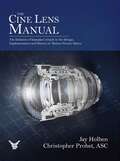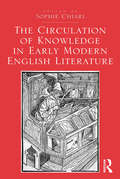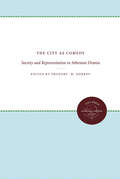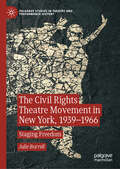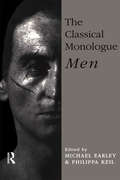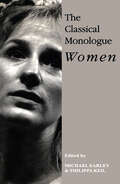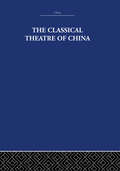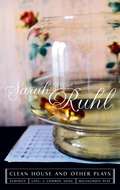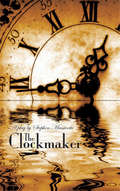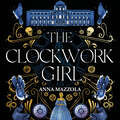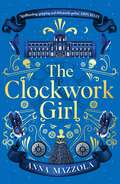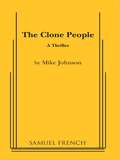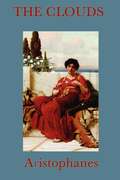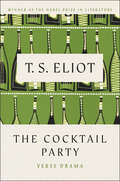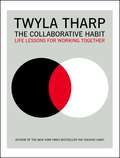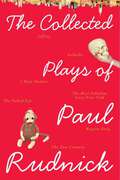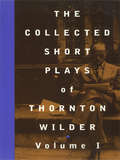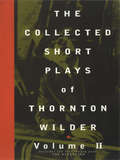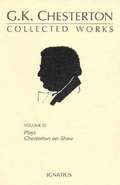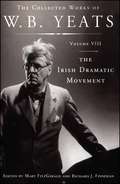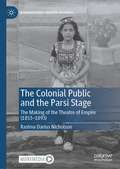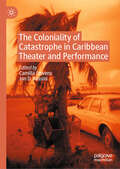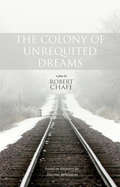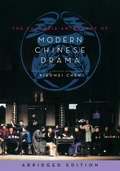- Table View
- List View
The Cine Lens Manual
by Jay Holben Christopher Probst AscFor anyone with a curiosity about cinema optics, The Cine Lens Manual is the definitive filmmaker's guide to the design, implementation, and history of motion picture optics. Authors Jay Holben and Christopher Probst share more than 60 years experience as cinematographers, educators, and technical journalists, creating a manual for anyone who seeks a deeper understanding of the cinema lens. This hardcover offers a comprehensive examination of the cine lens, with a deep dive into the art and science behind creating a cinema lens. <P><P> Cinematographers, directors, VFX artists, camera assistants, animators, historians, students, and rental house technicians will all benefit from the clear, easy to understand concepts, explained in simple language. Extensively illustrated, this manual examines the history and evolution of the cinema lens and motion picture formats.
The Circulation of Knowledge in Early Modern English Literature
by Sophie ChiariWith its many rites of initiation (religious, educational, professional or sexual), Elizabethan and Jacobean education emphasized both imitation and discovery in a struggle to bring population to a minimal literacy, while more demanding techniques were being developed for the cultural elite. The Circulation of Knowledge in Early Modern English Literature examines the question of transmission and of the educational procedures in16th- and 17th-century England by emphasizing deviant practices that questioned, reassessed or even challenged pre-established cultural norms and traditions. This volume thus alternates theoretical analyses with more specific readings in order to investigate the multiple ways in which ideas then circulated. It also addresses the ways in which the dominant cultural forms of the literature and drama of Shakespeare’s age were being subverted. In this regard, its various contributors analyze how the interrelated processes of initiation, transmission and transgression operated at the core of early modern English culture, and how Christopher Marlowe, William Shakespeare and Thomas Middleton, or lesser known poets and playwrights such as Thomas Howell, Thomas Edwards and George Villiers, managed to appropriate these cultural processes in their works.
The City as Comedy: Society and Representation in Athenian Drama
by Gregory W. DobrovThese thirteen essays combine classical scholars' interest in theatrical production with a growing interdisciplinary inquiry into the urban contexts of literary production. Taking as their departure point the annual comic competitions at the Athenian dramatic festivals, the contributors examine how the polis--as a place, a political entity, a specific social organization, and a set of ideological representations--was enacted on stage from the middle of the fifth century B.C. through the fourth. Applying a variety of critical approaches to Athenian comedy, these essays are grouped around three broad categories: utopianism, fissures in the social fabric, and the new polis of fourth-century comedy. The contributors explore the sociopolitical and material contexts of the works discussed and trace the genre into the fourth century, when it underwent profound changes. Simultaneously a study of classical Greek literature and an analysis of cultural production, this collection reveals how for two centuries Athens itself was transformed, staged as comedy, and, ultimately, shaped by contemporary material, social, and ideological forces. The contributors are Elizabeth Bobrick, Gregory Crane, Gregory Dobrov, Malcolm Heath, Jeffrey Henderson, Timothy P. Hofmeister, Thomas K. Hubbard, David Konstan, Heinz-GAnther Nesselrath, Frank Romer, Ralph M. Rosen, Niall W. Slater, and John Wilkins.A UNC Press Enduring Edition -- UNC Press Enduring Editions use the latest in digital technology to make available again books from our distinguished backlist that were previously out of print. These editions are published unaltered from the original, and are presented in affordable paperback formats, bringing readers both historical and cultural value.
The Civil Rights Theatre Movement in New York, 1939–1966: Staging Freedom (Palgrave Studies in Theatre and Performance History)
by Julie BurrellThis book argues that African American theatre in the twentieth century represented a cultural front of the civil rights movement. Highlighting the frequently ignored decades of the 1940s and 1950s, Burrell documents a radical cohort of theatre artists who became critical players in the fight for civil rights both onstage and offstage, between the Popular Front and the Black Arts Movement periods. The Civil Rights Theatre Movement recovers knowledge of little-known groups like the Negro Playwrights Company and reconsiders Broadway hits including Lorraine Hansberry’s A Raisin in the Sun, showing how theatre artists staged radically innovative performances that protested Jim Crow and U.S. imperialism amidst a repressive Cold War atmosphere. By conceiving of class and gender as intertwining aspects of racism, this book reveals how civil rights theatre artists challenged audiences to reimagine the fundamental character of American democracy.
The Classical Monologue (M): Men
by Michael Earley Philippa KeilThe Classical Monologue in two volumes, one for men and one for women, is a fresh selection of the best speeches from the repertoire of the classical theatre, from the Greeks to the beginning of the 20th century. These great dramatic monologues--from all periods and styles, all varied in tone and genre--make an indispensable actor's companion for auditioning, rehearsing and performing. Each monologue is accompanied by textual notes explaining any unusual vocabulary or syntax, and by commentary in which the editors offer interpretative points and practical advice in preparing the speech for performance. Both beginners and experienced actors will find The Classical Monologue a treasury of theatrical riches waiting to be released on stage.
The Classical Monologue (W): Women
by Michael Earley Philippa KeilFirst Published in 1993. Routledge is an imprint of Taylor & Francis, an informa company.
The Classical Theatre of China
by A.C. ScottFirst published in 1957. Besides tracing the history and development of the Peking Theatre, this volume explains acting techniques, stage costume and symbolism, musical forms and the various types of plays.
The Clean House and Other Plays
by Sarah Ruhl"Passionate. Show-stopping. Daringly over-the-top and impressively consistent in its delirious excess. The Clean House shines."--New Haven Advocate"The Clean House is not, by any means, a traditional boy-meets-girl story. In fact disease, death, and dirt are among the subjects it addresses. This comedy is romantic, deeply so, but in the more arcane sense of the word: visionary, tinged with fantasy, extravagant in feeling, maybe a little nuts."--The New York Times"Touching, inventive, invigoratingly compact, and luminously liquid, Eurydice reframes the ancient myth of ill-fated love to focus not on the bereaved musician but on his dead bride--and on her struggle with love beyond the grave."--San Francisco ChronicleThis volume is the first publication of Sarah Ruhl, "a playwright with a unique comic voice, perspective, and sense of theater" (Variety), who is fast leaving her mark on the American stage. In the award-winning Clean House--a play of uncommon romance and uncommon comedy--a maid who hates cleaning dreams about creating the perfect joke, while a doctor who treats cancer leaves his heart inside one of his patients. This volume also includes Eurydice, Ruhl's reinvention of the tragic Greek tale of love and loss, together with a third play still to be named.Sarah Ruhl received the prestigious Susan Smith Blackburn Prize in 2004 for her play The Clean House, which has been produced at Yale Repertory Theatre in New Haven, Wilma Theatre in Philadelphia, South Coast Repertory Theatre in Costa Mesa, and Woolly Mammoth Theatre Company in Washington, DC. Her play Eurydice has been produced at Madison Repertory Theatre and Berkeley Repertory Theatre.
The Clockmaker
by Stephen Massicotte"WHO ARE YOU?" Monsieur Pierre (the immigration official) poses his usual question, but Heinrich's unusual answer sets in motion a metaphysical rollercoaster. Why would a simple statement of name and profession bring so much attention to an unassuming clockmaker? Maybe because that's two more things than anyone else in this place remembers…? Soon, Heinrich is reminding his new friend Frieda of memories she's forgotten and even summoning up a few of his own—of forbidden love, and crimes he may or may not have committed. Is it possible to be guilty of being about to commit a crime, as Monsieur Pierre suspects? And why wouldn't one recall something so significant as premeditating murder? Armed with a newfound-yet-familiar love for each other, Heinrich and Frieda set about solving this Kafkaesque puzzle.Winner of the Betty Mitchell Award for Best New Play (2009) and named best Canadian play of the 2010-2011 season at the inaugural Toronto Theatre Critics' Awards.
The Clockwork Girl
by Anna MazzolaParis, 1750. In the midst of an icy winter, as birds fall frozen from the sky, chambermaid Madeleine Chastel arrives at the home of the city's celebrated clockmaker and his clever, unworldly daughter. Madeleine is hiding a dark past, and a dangerous purpose: to discover the truth of the clockmaker's experiments and record his every move, in exchange for her own chance of freedom. For as children quietly vanish from the Parisian streets, rumours are swirling that the clockmaker's intricate mechanical creations, bejewelled birds and silver spiders, are more than they seem. And soon Madeleine fears that she has stumbled upon an even greater conspiracy. One which might reach to the very heart of Versailles... A intoxicating story of obsession, illusion and the price of freedom.
The Clockwork Girl: The captivating and hotly-anticipated mystery you won’t want to miss in 2022!
by Anna Mazzola'Evocative, chilling, compelling' TAMMY COHEN'Breathtakingly good' ABIR MUKHERJEE'Kept me guessing until the end. An absolute masterpiece' JENNIFER SAINT'A deliciously dark historical novel of thrilling originality' ESSIE FOX'Spellbinding, gripping, immersive and deliciously gothic' ERIN KELLYParis, 1750.In the midst of an icy winter, as birds fall frozen from the sky, chambermaid Madeleine Chastel arrives at the home of the city's celebrated clockmaker and his clever, unworldly daughter. Madeleine is hiding a dark past, and a dangerous purpose: to discover the truth of the clockmaker's experiments and record his every move, in exchange for her own chance of freedom.For as children quietly vanish from the Parisian streets, rumours are swirling that the clockmaker's intricate mechanical creations, bejewelled birds and silver spiders, are more than they seem.And soon Madeleine fears that she has stumbled upon an even greater conspiracy. One which might reach to the very heart of Versailles...A intoxicating story of obsession, illusion and the price of freedom.
The Clone People: Hollywood Finish
by Mike JohnsonAll Groups / Thriller / 4 m., 5 f. / Interior / Jay Westcott and Nessa Paxton are two of Hollywood's most successful stars and a happily married couple. While filming on location, Nessa sustains an accidental blow on the head and flees to her home in Beverly Hills before anxious studio staff members can stop her. She bursts in on Jay and, nearly incoherent with hysteria, insists she is really Polly Ackerman, a girl who vanished just before their marriage. Jay fears for her sanity and, over her protests, he allows the studio to find her and provide medical help. Several strange events make him suspect she might be telling the truth and that something incredibly evil is going on at the studio where he may be the next victim. For an evening of plausible nightmare, suspense and breathtaking terror with a shocking surprise ending this show can't be excelled.
The Clouds
by AristophanesSocrates' "Thinkery" is at the center of Clouds, which spoofs untraditional techniques for educating young men.
The Cocktail Party: Verse Drama
by T. S. EliotA comedic play about the universal quest for meaning, written in some of Eliot's "most beautiful poetry" (The New York Times). A sterling example of contemporary theater, The Cocktail Party is a dramatic tour de force from one of our greatest writers to date.
The Collaborative Habit: Life Lessons for Working Together
by Jesse Kornbluth Twyla TharpIn a career that has spanned four decades, choreographer Twyla Tharp has collaborated with great musicians, designers, thousands of dancers, and almost a hundred companies. She's experienced the thrill of shared achievement and has seen what happens when group efforts fizzle. Her professional life has been -- and continues to be -- one collaboration after another. In this practical sequel to her national bestseller The Creative Habit, Tharp explains why collaboration is important to her -- and can be for you. She shows how to recognize good candidates for partnership and how to build one successfully, and analyzes dysfunctional collaborations. And although this isn't a book that promises to help you deepen your romantic life, she suggests that the lessons you learn by working together professionally can help you in your personal relationships. These lessons about planning, listening, organizing, troubleshooting, and using your talents and those of your coworkers to the fullest are not limited to the arts; they are the building blocks of working with others, like if you're stuck in a 9-to-5 job and have an unhelpful boss. Tharp sees collaboration as a daily practice, and her book is rich in examples from her career. Starting as a twelve-year-old teaching dance to her brothers in a small town in California and moving through her work as a fledgling choreographer in New York, she learns lessons that have enriched her collaborations with Billy Joel, Jerome Robbins, Mikhail Baryshnikov, Bob Dylan, Elvis Costello, David Byrne, Richard Avedon, Milos Forman, Norma Kamali, and Frank Sinatra. Among the surprising and inspiring points Tharp makes in The Collaborative Habit: -Nothing forces change more dramatically than a new partnership. -In a good collaboration, differences between partners mean that one plus one will always equal more than two. A good collaborator is easier to find than a good friend. If you've got a true friendship, you want to protect that. To work together is to risk it. -Everyone who uses e-mail is a virtual collaborator. -Getting involved with your collaborator's problems may distract you from your own, but it usually leads to disaster. -When you have history, you have ghosts. If you're returning to an old collaboration, begin at the beginning. No evocation of old problems and old solutions. -Tharp's conclusion: What we can learn about working creatively and in harmony can transform our lives, and our world.
The Collected Plays of Paul Rudnick
by Paul RudnickThe definitive collection of theatrical hilarity by one of America’s preeminent playwrights and humoristsThe New York Times has proclaimed that “line by line, Mr. Rudnick may be the funniest writer for the stage in the United States today.” Now, this collection of his plays will remind readers far and wide of the great influence that Paul Rudnick’s comic genius has had on the world of American theater.Here are I Hate Hamlet, the play that marked Rudnick’s Broadway debut; Jeffrey, the long-running off-Broadway smash about gay life during the AIDS crisis of the early ’90s; as well as five other onstage gems enlivened by Rudnick’s signature rapier wit.The Collected Plays of Paul Rudnick is a must-have item for any fan of this theatrical master—and a necessary addition to all courses in dramatic literature.
The Collected Short Plays of Thornton Wilder, Volume O
by Thornton Wilder John GuareThornton Wilder, author of such landmark works for the stage as Our Town and The Skin of Our Teeth as well as the classic novel The Bridges of San Luis Rey is considered one of America's greatest man of letters. This two volume publication collects the complete short works for the stage, including a never-before-published one act play.
The Collected Short Plays of Thornton Wilder, Volume T
by Thornton WilderThe publication of volume two of this landmark collection celebrates the close of the centennial year of Thornton Wilder's birth. This volume collects 17 plays from the author's three-minute and five-minute plays for five actors series and includes the full-length play The Alcestiad, a major work by the author of Our Town and The Skin of Our Teeth which has long been unavailable.
The Collected Works of G. K. Chesterton XI: Plays and Chesterton on Shaw
by G. K. Chesterton Dennis J. ConlonThis volume includes the collected plays of G. K. Chesterton, his controversial writings on Bernard Shaw (who referred to GKC as a colossal genius), and a bibliography.
The Collected Works of W.B. Yeats Volume VIII: The Irish Dramatic Movement
by Richard J. Finneran William Butler Yeats Mary FitzgeraldThe Collected Works of W. B. Yeats, Volume VIII: The Irish Dramatic Movement is part of a fourteen-volume series under the general editorship of eminent Yeats scholars Richard J. Finneran and George Mills Harper. This complete edition includes virtually all of the Nobel laureate's published work, in authoritative texts and with extensive explanatory notes. Edited by the distinguished Yeats scholars Mary FitzGerald and Richard J. Finneran, The Irish Dramatic Movement gathers together -- for the first time -- all of the poet's time-honored essays on drama and the groundbreaking movement that led to the enduring Irish theater of today. Although the reputation of W. B. Yeats as one of the preeminent writers of the twentieth century rests primarily on his poetry, drama and the theatre were among his abiding concerns. Indeed, in 1917 he wrote, "I need a theatre; I believe myself to be a dramatist." Here in this volume is the collection of all his major dramatic criticism for the years 1899-1919, including previously uncollected material. A practicing dramatist himself, Yeats had strong convictions about the goals of the Irish theater and the appropriate plays to be produced. The essays in this collection address many topics, from the turbulent early years of what became the Abbey Theatre to the controversies over the plays of John Millington Synge and the relationship between drama and nationalism. Also evident are Yeats's judgments on numerous plays, playwrights, and productions, both in Irish and in English. FitzGerald and Finneran's volume includes an Introduction and a History of the Text, as well as copious but unobtrusive annotation. The Irish Dramatic Movement is an essential volume for both readers of Yeats and students of the early years of twentieth-century theater.
The Colonial Public and the Parsi Stage: The Making of the Theatre of Empire (1853-1893) (Transnational Theatre Histories)
by Rashna Darius NicholsonThe Colonial Public and the Parsi Stage is the first comprehensive study of the Parsi theatre, colonial South and Southeast Asia’s most influential cultural phenomenon and the precursor of the Indian cinema industry. By providing extensive, unpublished information on its first actors, audiences, production methods, and plays, this book traces how the theatre—which was one of the first in the Indian subcontinent to adopt European stagecraft—transformed into a pan-Asian entertainment industry in the second half of the nineteenth century. Nicholson sheds light on the motivations that led to the development of the popular, commercial theatre movement in Asia through three areas of investigation: the vernacular public sphere, the emergence of competing visions of nationhood, and the narratological function that women served within a continually shifting socio-political order. The book will be of interest to scholars across several disciplines, including cultural history, gender studies, Victorian studies, the sociology of religion, colonialism, and theatre.
The Coloniality of Catastrophe in Caribbean Theater and Performance
by Camilla Stevens Jon D. RossiniThe Coloniality of Catastrophe in Caribbean Theater and Performance calls attention to theater&’s capacity to reveal the constructed roots of catastrophe and offer counter catastrophic strategies to live and imagine otherwise. Engaging anglophone, francophone, and hispanophone theater from across the Caribbean and its diaspora, the 12 essays and one interview foster a pan-Caribbean view of theater, identifying shared tropes and theatrical strategies. Essays address a range of 20th and 21st century works that center the relentless cycle of &“natural&” disasters such as earthquakes, hurricanes, and floods as well as the catastrophic effects of continuing coloniality more broadly. In doing so, they unsettle the normalization of catastrophe. Exploring the power of theater&’s situatedness, its iterative quality, and its special arrangement of time, these works remind us of the impact of embodied co-presence in the political realities of everyday life.
The Colony of Unrequited Dreams
by Robert ChafeSpanning two decades, Smallwood’s story is anchored and propelled by one of Johnston’s most memorable creations: the fictitious Sheilagh Fielding, a caustic newspaper columnist whose own battles with the past and alcohol addiction find full vent and expression in her tireless dogging of Smallwood’s climb to power. At its heart, The Colony of Unrequited Dreams is the story of a man whose career is buoyed and sometimes sunk by his unresolved feelings for a woman he never allowed himself to love. It is also the story of Newfoundland’s final years as a country, the end of one cultural and political trajectory, and the beginning of another.
The Columbia Anthology of Modern Chinese Drama
by Xiaomei ChenThe first of its kind in English, this anthology translates twenty-two popular Chinese plays published between 1919 and 2000, accompanied by a critical introduction to the historical, cultural, and aesthetic evolution of twentieth-century Chinese spoken drama. Primarily comprising works from the People's Republic of China, though including representative plays from Hong Kong and Taiwan, this collection not only showcases the revolutionary rethinking of Chinese theater and performance that began in the late Qing dynasty. It also highlights the formation of Chinese national and gender identities during a period of tremendous social and political change, along with the genesis of contemporary attitudes toward the West. Early twentieth-century Chinese drama embodies the uncertainty and anxiety brought on by modernism, socialism, political conflict, and war. After 1949, PRC theater painted a complex portrait of the rise of communism in China, with the ideals of Chinese socialism juxtaposed against the sacrifices made for a new society. The Cultural Revolution promoted a "model theater" cultivated from the achievements of earlier, leftist spoken drama, even though this theater arose from the destruction of old culture. Post-Mao drama addresses the socialist legacy and the attempts of a wounded nation to reexamine its cultural roots. Taiwan's spoken drama synthesizes regional and foreign traditions, and Hong Kong's spoken drama sparkles as a hybrid of Chinese and Western influences. Immensely valuable for cross-disciplinary, comparative, and performance study, this anthology provides essential perspective on China's theatricality and representation of political life.
